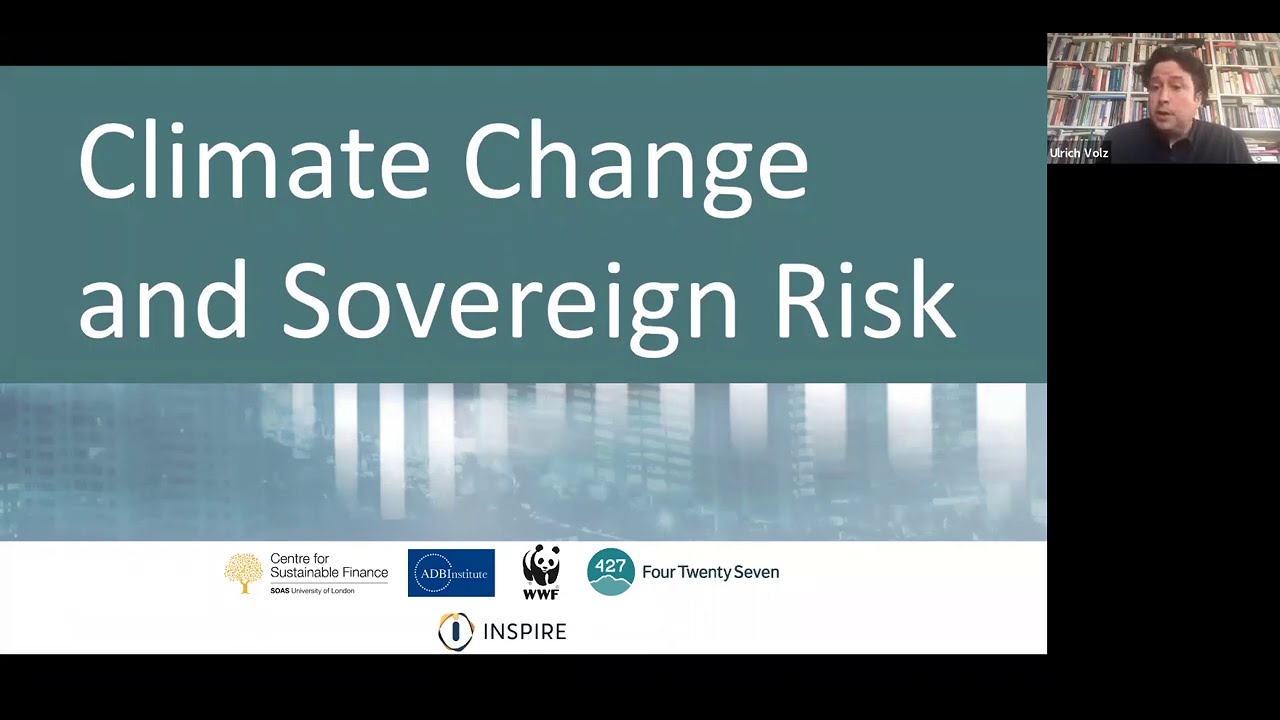Sovereign risk and climate change


Project information
Principal Investigator
- Ulrich Volz (SOAS)
Co-Investigators
- John Beirne (Asian Development Bank Institute)
- Emilie Mazzacurati (Four Twenty Seven and UC Davis)
- Jeanne Stampe (WWF and Asia Sustainable Finance Initiative)
Funder
- International Network for Sustainable Financial Policy Insights, Research, and Exchange (INSPIRE)
- ClimateWorks Foundation
Duration
- 2019–2020
Overview
The project will investigate how climate risk impacts upon sovereign credit risk and debt sustainability and assess the implications from a financial regulation and central banking perspective. In particular, we seek to address the following two sub-questions:
- Through which channels can climate-related risks affect sovereign risk and how important are their respective impacts?
- What are the regulatory and supervisory implications for financial supervisors and central banks?
The research will be conducted in two parts. First, we will develop a conceptual framework that characterises the transmission channels between climate risk and sovereign risk, stressing the importance for financial regulators and central banks to integrate these risks into their operational frameworks in achieving their mandated objectives. Second, and building on this conceptual work, we will assess and quantify the climate-sovereign risk nexus for the ten member countries of the Association of Southeast Asian Nations (ASEAN), a group which comprises three members of the Central Banks and Supervisors Network for Greening the Financial System (NGFS) (Malaysia, Singapore, Thailand).
Southeast Asian countries are among those most heavily affected by climate change, with devastating impacts on the economy that are increasing at a faster pace than in other regions. We will assess macro-financial and sovereign risk stemming from climate change for ASEAN countries and consider possible policy responses by financial regulators and central banks.
Building on the research team’s previous empirical work on the pricing of sovereign risk and the impact of climate risk on the cost of sovereign borrowing in climate-vulnerable countries, we will combine different econometric modelling approaches to estimate the impact of climate-related risks on fiscal health and sovereign risk, and how these may impact upon macro-financial stability.
The results will inform stress-testing exercises to understand and identify different thresholds and layers of risk. In partnership with policymakers, these exercises will inform choices around public risk management and financing strategies, and adequate prudential policy responses.
Launch event
Policy impact
The research feeds into NGFS workstream 2 on macro-economic risk and contributes to an improved understanding of sovereign risk in developing and emerging markets for policy purposes.
Notably, this research will feed into the design of stress testing and scenario analysis which need to take account of sovereign risk and potential feedback loops between climate-induced fiscal vulnerability and financial sector instability. Central banks and financial supervisors ought to monitor fiscal positions and debt sustainability closely, as well as the exposure of financial institutions to sovereign risk. Moreover, the research will provide insights into policy coordination between the central bank and government in order to optimise public debt management.
Our research may also inform the macro-financial surveillance work of the IMF and other international organisations advising on macro-financial stability and climate-related fiscal risks. Finally, it informs how micro-prudential supervision can support financial institutions to integrate climate factors into financial decision-making, including assessments of their vulnerability to climate risk via exposure to sovereign debt and the mispricing of credit in markets with worsening sovereign credit profiles. This aligns with the goals of NGFS workstream 1.




